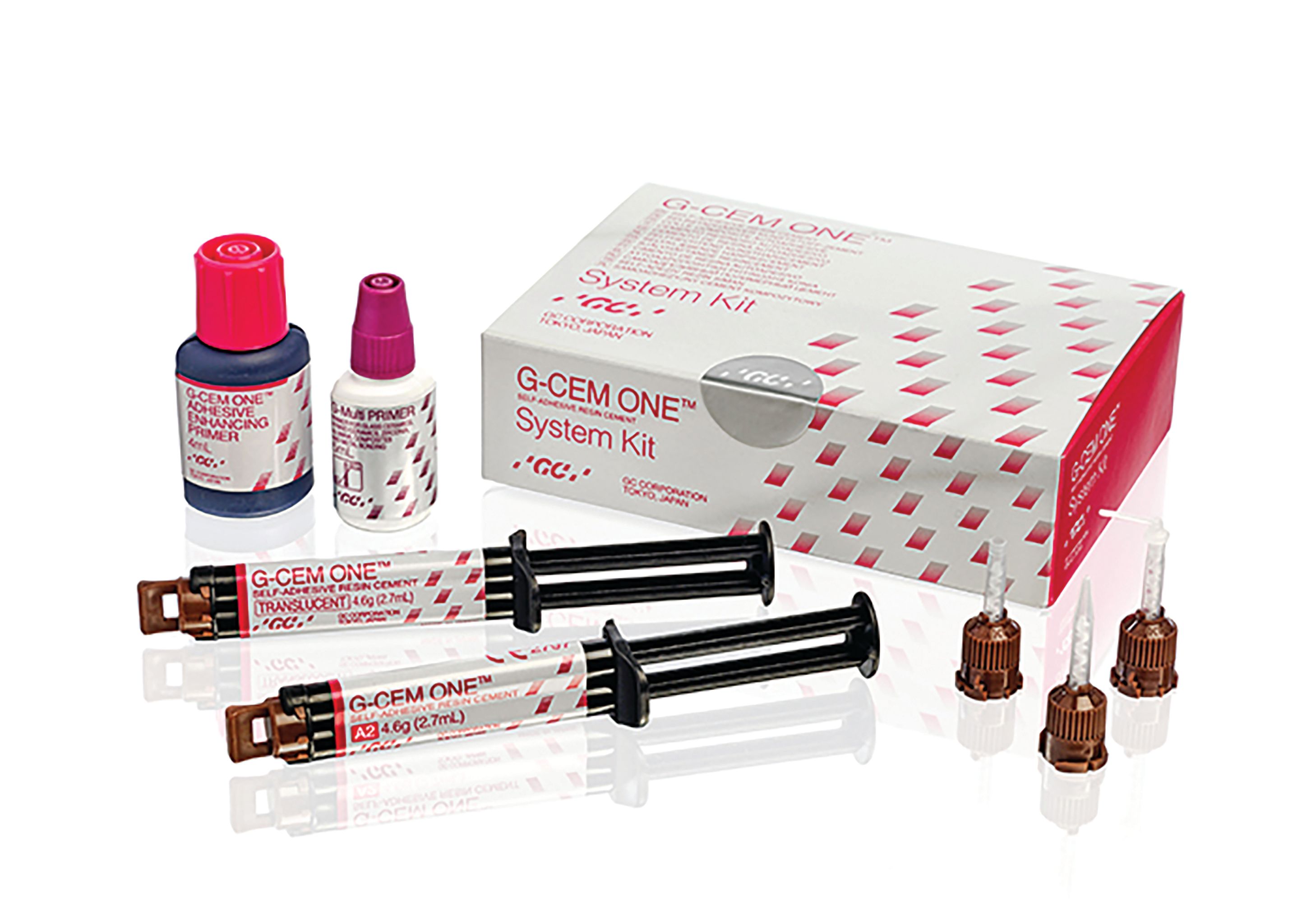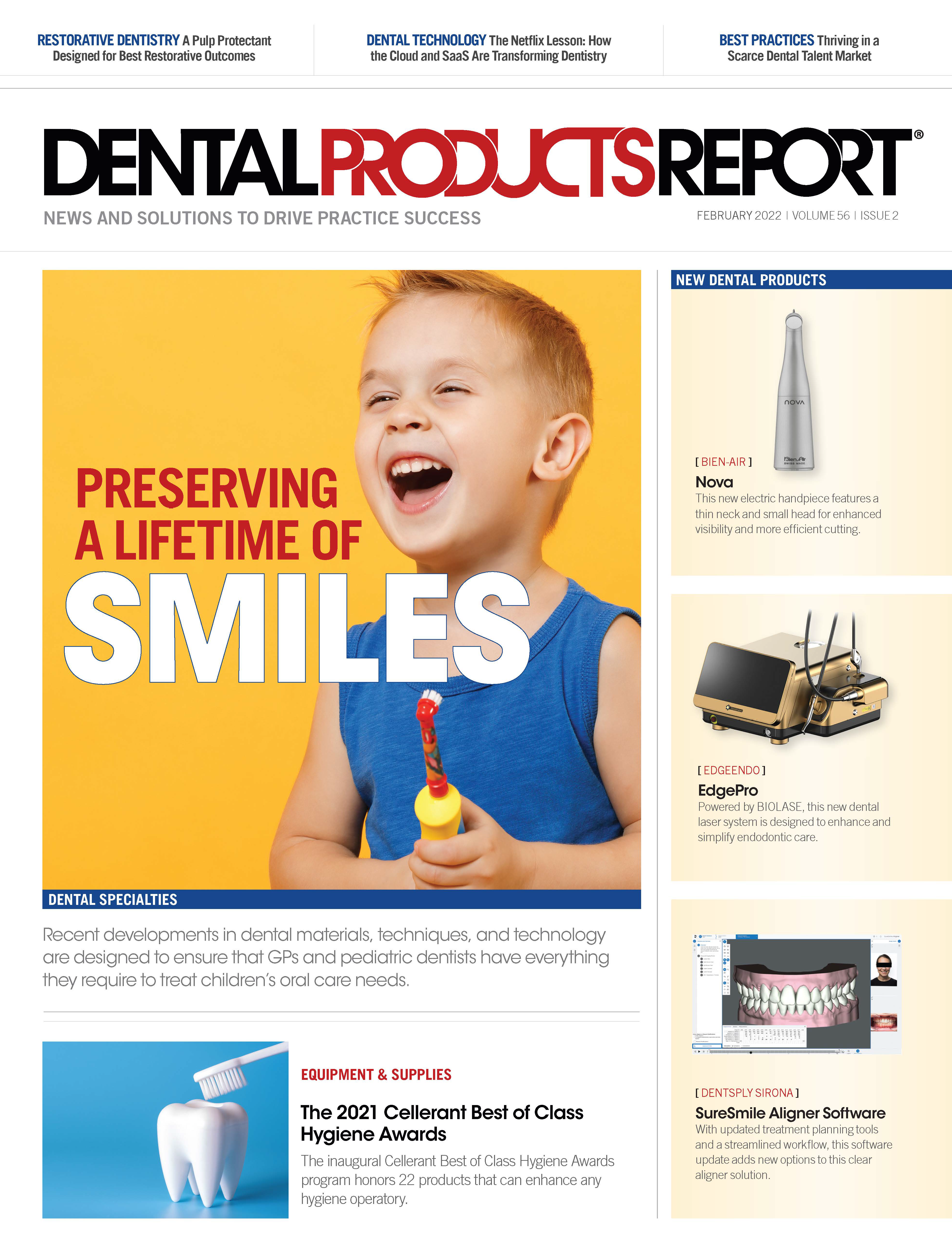G-CEM ONE
G-CEM ONE is a self-adhesive resin cement that is formulated to combine high bond strength, effortless clean-up, and lasting esthetics. It also features a self-curing ability for a wide range of indications. It is designed to be universal, non–technique sensitive, and versatile and effective in all cementation procedures for any type of restoration. It is indicated for the cementation of all types of ceramic, resin, and metal-based inlays, onlays, crowns, and bridges.
GC America
800-323-7063 | gcamerica.com
Dentistry continues to evolve on multiple levels, with changes in indirect restorative materials, the need for reproducible results, and implementation of cementation.
Cementation is highly influenced by variabilities in tooth preparation and length, enamel and dentin substrates, restorative properties, and surface adhesion, as well as curing light transmission through the materials, which is compromised with metal and zirconia.
Many dentists around the world have this “wish list” of qualities:
- Reliable: optimal performance for retentive and nonretentive preparations
- Universal: excellent bond strength to tooth and all substrates, including zirconia, metal alloys, glass ceramics, and hybrid ceramics
- Technique insensitive: exceptional self-curing ability and moisture tolerance for peace of mind
- Esthetic: invisible, wear-resistant margins for esthetic outcomes
- Simple: reduced inventory, reproducible results, and optimized workflow
Fortunately, GC America recently developed G-CEM ONE™—a dual-cure, self-adhesive resin cement with high adhesive bond strength, which can be used for extended indications when using its optional Adhesive Enhancing Primer (AEP). The objective of this system is to provide dentists with 1 simple solution for all day-to-day procedures.
The beauty of AEP is that it can be applied and dried without light curing. With GC America’s Touch Cure technology, the accelerator in the AEP reacts with the initiator in the cement during crown luting, which enhances curing capacity independent of light. It not only overcomes the light transmission issue in all restorations, but it also reliably overcomes challenging situations such as:
- Renewal of an old crown
- Limited height of abutment
- Low retentive preparations for onlays, inlays, and veneers
- Saliva contamination
Fifteen members of Catapult Education were asked to evaluate G-CEM ONE, which is built on tried-and-true existing technology. The evaluators typically use a resin-modified glass ionomer or other resin cement for most of their cementations. In terms of finding a supreme cement, the evaluators were overwhelmingly looking for one that could be used on all substrates and would be easy to handle and clean up. Surprisingly, although many thought bond strength was important, it didn’t seem as important as the handling and cleanup of the material.
Most of the evaluators cemented at least 5 restorations with the material and, to this date, this evaluator has cemented more than 40. The most common restoration cemented was hybrid ceramic inlays and onlays, followed by porcelain-fused-to-metal bridges, and then lithium disilicate crowns and zirconia crowns. The following is what the group found:
- More than 80% of the evaluators noted that they used the adhesive primer most of the time, with one evaluator stating, “If I could add more bond strength, why wouldn’t I use it?”
- Handling was not an issue for anyone, with nearly 99% of the evaluators liking how G-CEM ONE handled. Evaluators noted that the syringe size and extrusion force of the material were also very good.
- Cleanup methods varied between evaluators; 60% of the evaluators tack-cured the material and then cleaned it up, and the remainder waited for it to partially set and cleaned it up easily when it was rubbery or used a brush to wipe away the cement when wet. More than 90% felt cement removal was easy.
- More than 80% said they would purchase the G-CEM ONE, and 100% said they would recommend this to a colleague.
Overall, the group of 15 doctors were very impressed with many of the added features. This is a strong evaluation, especially in a product category for which every clinician is looking for a more idyllic solution.
Case No. 1
A vacationing patient from out of state broke her 20-year-old ceramic crown on tooth No. 8 while chewing. Although the tooth had remaining tooth structure to create a ferrule, the preexisting post had fractured and would ideally be removed by an endodontist prior to replacing the crown.
Fortunately, the crown could be accurately recemented with G-CEM ONE using AEP, and the missing porcelain could be replaced using G-ænial™ Universal Injectable
composite (GC America), so the patient could resume her vacation with a big smile and get more ideal care when time and convenience were optimal.
Case No. 2
A 40-year-old patient with heavy bruxing needed a preexisting crown replaced on an endodontic tooth that had limited occlusal space. After her tooth was rebuilt, a zirconia crown was treated by air abrading internally and painted with an methacryloyloxydecyl dihydrogen phosphate (MDP) product. After carefully painting the short prep with AEP, the crown was easily cemented and cleaned up with G-CEM ONE.
Summary
GC America has created a reliable, efficient, and easy-to-implement cementation product that could be considered a “Swiss Army knife” for handling multiple types of indirect restorations that can be used for retentive and nonretentive preparations. Even better, when isolation is a challenge, research and our study have proven that G-CEM ONE can overcome saliva contamination, assuming strict adherence to manufacturer instructions and using AEP.
Overall, GC America has produced a true winner.
Reference
1. Ishii R, Yokoyama M, Tamura T, Takamizawa T, Miyazaki M. Shear bond strength of resin cements to saliva contaminated dentin. 2020. 153rd Meeting of the Japanese Society of Conservative Dentistry. P24. (available only in Japanese)

